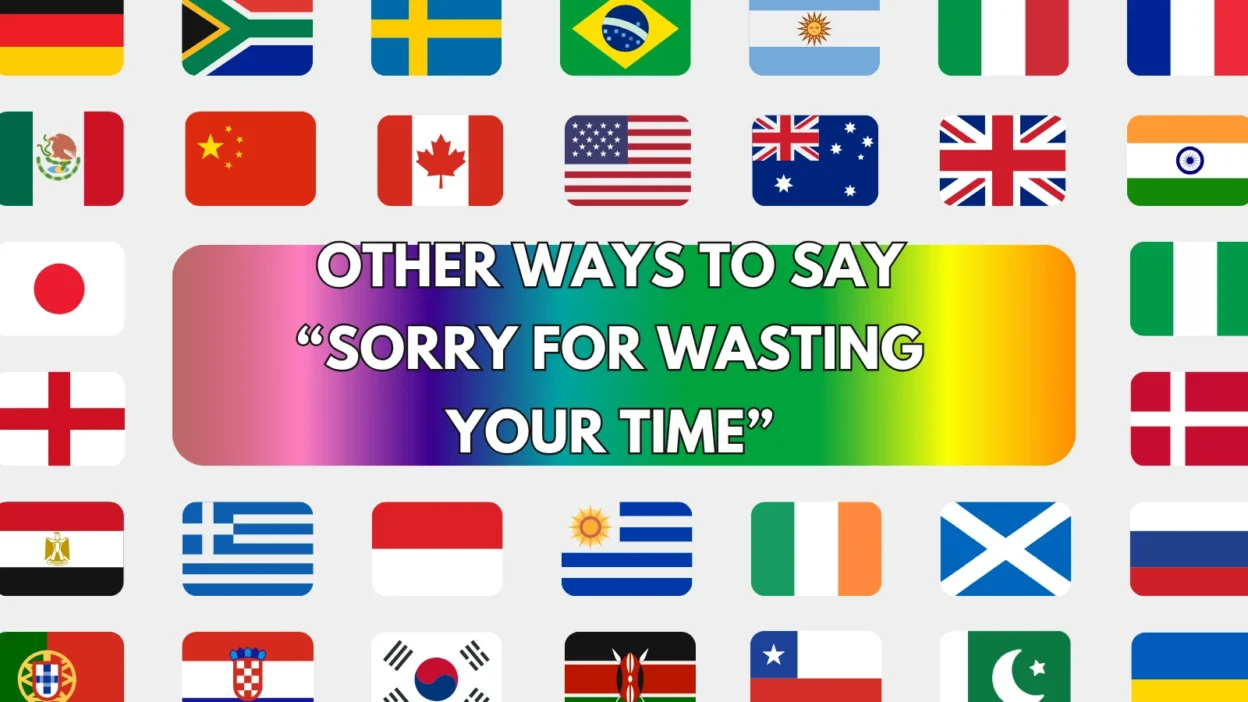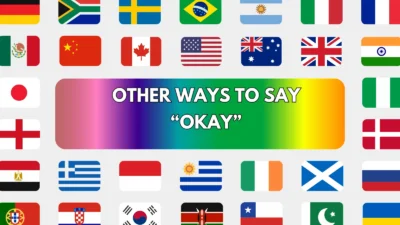Saying “sorry for wasting your time” expresses humility and awareness that someone may have spent effort or attention unnecessarily. However, in professional or personal communication, it’s often better to express this sentiment in a way that sounds sincere, respectful, and positive without sounding overly self-critical.
Here are 25 alternative ways to say “sorry for wasting your time,” with meanings, examples, best uses, and tones that fit different settings — from emails to conversations.
1. I appreciate your patience
Meaning: Thanking someone for waiting or being understanding.
Detailed Explanation: Focuses on gratitude instead of guilt, keeping the tone positive.
Scenario Example: I appreciate your patience while I sorted things out.
Best Use: Professional emails or customer communication.
Tone: Polite, positive.
2. Thanks for your understanding
Meaning: Acknowledges someone’s empathy or flexibility.
Detailed Explanation: Avoids self-blame while recognizing the other person’s courtesy.
Scenario Example: Thanks for your understanding as I finalize the report.
Best Use: Work-related delays or misunderstandings.
Tone: Appreciative, respectful.
3. I value your time
Meaning: Expresses respect for someone’s time investment.
Detailed Explanation: Reframes the apology as acknowledgment of their effort.
Scenario Example: I truly value your time and appreciate your input today.
Best Use: Meetings, discussions, interviews.
Tone: Professional, sincere.
4. Thank you for bearing with me
Meaning: Appreciates someone’s patience during a delay or issue.
Detailed Explanation: Keeps the tone warm and courteous.
Scenario Example: Thank you for bearing with me while I got everything ready.
Best Use: When you caused a delay but it wasn’t serious.
Tone: Friendly, polite.
5. My apologies for the inconvenience
Meaning: A formal way to express regret for causing trouble.
Detailed Explanation: Standard in customer service or formal writing.
Scenario Example: My apologies for the inconvenience earlier today.
Best Use: Professional or business situations.
Tone: Formal, courteous.
6. Sorry for the delay
Meaning: Admits lateness without over-apologizing.
Detailed Explanation: Simple and widely accepted in both casual and business settings.
Scenario Example: Sorry for the delay — I appreciate your patience.
Best Use: Emails, project management, communication delays.
Tone: Polite, straightforward.
7. I didn’t mean to take up so much of your time
Meaning: A direct but polite acknowledgment of time use.
Detailed Explanation: Maintains sincerity while sounding self-aware.
Scenario Example: I didn’t mean to take up so much of your time today.
Best Use: After long meetings or calls.
Tone: Genuine, considerate.
8. Thanks for taking the time
Meaning: Shows appreciation for the effort someone invested.
Detailed Explanation: Emphasizes gratitude instead of regret.
Scenario Example: Thanks for taking the time to meet with me today.
Best Use: Follow-up emails or messages.
Tone: Appreciative, professional.
9. I appreciate your time and effort
Meaning: Expresses gratitude for someone’s attention and work.
Detailed Explanation: Works as a respectful alternative to apologizing.
Scenario Example: I appreciate your time and effort reviewing my proposal.
Best Use: Workplace, mentorship, or client settings.
Tone: Respectful, formal.
10. Sorry for the confusion
Meaning: Admits a misunderstanding without sounding defensive.
Detailed Explanation: Helps clarify mistakes politely.
Scenario Example: Sorry for the confusion earlier — I should’ve explained it better.
Best Use: Clarifying instructions or messages.
Tone: Professional, polite.
11. I didn’t mean to cause trouble
Meaning: Expresses regret for creating extra work or stress.
Detailed Explanation: Personal and empathetic tone.
Scenario Example: I didn’t mean to cause trouble with my late submission.
Best Use: Personal or informal professional contexts.
Tone: Humble, sincere.
12. I know your time is valuable
Meaning: Recognizes someone’s importance and effort.
Detailed Explanation: Acknowledges respect while staying courteous.
Scenario Example: I know your time is valuable, so I’ll keep this brief.
Best Use: Meetings, interviews, calls.
Tone: Professional, polite.
13. Thank you for waiting
Meaning: A polite acknowledgment of patience.
Detailed Explanation: Keeps the message simple and positive.
Scenario Example: Thank you for waiting while I finalized the details.
Best Use: In-person conversations, customer support, or casual chats.
Tone: Warm, grateful.
14. I appreciate your flexibility
Meaning: Thanks someone for adjusting to your situation.
Detailed Explanation: Positive and professional, avoids self-criticism.
Scenario Example: I appreciate your flexibility with the meeting schedule.
Best Use: Workplace or scheduling changes.
Tone: Professional, appreciative.
15. I hope I didn’t inconvenience you
Meaning: Expresses awareness and politeness about causing minor trouble.
Detailed Explanation: Sounds humble and careful.
Scenario Example: I hope I didn’t inconvenience you with my request.
Best Use: Both formal and personal messages.
Tone: Gentle, considerate.
16. Sorry for taking too long
Meaning: Apologizes for not being timely.
Detailed Explanation: Common, clear, and polite.
Scenario Example: Sorry for taking too long to get back to you.
Best Use: Late replies or reports.
Tone: Casual-professional, kind.
17. I didn’t mean to hold you up
Meaning: Admits unintentionally delaying someone.
Detailed Explanation: Simple and conversational.
Scenario Example: I didn’t mean to hold you up before your next meeting.
Best Use: Informal workplace or everyday chat.
Tone: Friendly, natural.
18. Sorry for the mix-up
Meaning: Apologizes for a mistake or confusion.
Detailed Explanation: Keeps the tone light and cooperative.
Scenario Example: Sorry for the mix-up — I’ll make sure it doesn’t happen again.
Best Use: Email follow-ups or logistics errors.
Tone: Professional, polite.
19. Thank you for your cooperation
Meaning: Appreciates someone’s help despite issues.
Detailed Explanation: Reframes the apology as gratitude.
Scenario Example: Thank you for your cooperation during this adjustment period.
Best Use: Business communication, projects.
Tone: Formal, appreciative.
20. My bad for the delay
Meaning: Informal way to admit a small mistake or delay.
Detailed Explanation: Casual, often used among peers.
Scenario Example: My bad for the delay — I got caught up earlier.
Best Use: Informal chats, team communication.
Tone: Friendly, casual.
21. I owe you one
Meaning: A casual way to show appreciation after someone helps.
Detailed Explanation: Implies gratitude and willingness to return the favor.
Scenario Example: Thanks for waiting — I owe you one!
Best Use: Friendly or informal situations.
Tone: Playful, appreciative.
22. Sorry for any trouble I caused
Meaning: Acknowledges responsibility in a kind way.
Detailed Explanation: Balanced and self-aware.
Scenario Example: Sorry for any trouble I caused during the transition.
Best Use: Emails, messages, customer service.
Tone: Polite, humble.
23. I didn’t mean to interrupt
Meaning: Acknowledges accidentally disturbing someone.
Detailed Explanation: Direct and courteous.
Scenario Example: I didn’t mean to interrupt — please continue.
Best Use: Meetings, conversations.
Tone: Respectful, considerate.
24. Sorry if I took too much of your time
Meaning: Expresses humility and awareness.
Detailed Explanation: Balanced between politeness and sincerity.
Scenario Example: Sorry if I took too much of your time this afternoon.
Best Use: After discussions, calls, or mentoring sessions.
Tone: Gentle, polite.
25. Thanks for your time today
Meaning: Shows appreciation without sounding apologetic.
Detailed Explanation: Positive closure to any conversation or meeting.
Scenario Example: Thanks for your time today — I really appreciate your input.
Best Use: Professional and everyday communication.
Tone: Appreciative, confident.
Conclusion
“Sorry for wasting your time” shows humility, but saying it too often can sound harsh on yourself or overly formal. Instead, these 25 alternatives let you express sincerity, gratitude, or awareness in a way that fits every tone — from professional to casual.
Whether you choose “I appreciate your patience,” “Thanks for your understanding,” or “I value your time,” you’re communicating respect and consideration without sounding apologetically repetitive.

Naz Fatima is an author at Saypadia who specializes in writing clear, relatable, and reader-friendly content about language, expressions, and modern terminology. She enjoys breaking down meanings with real-life context so readers can quickly understand and apply them. Naz’s work reflects a strong commitment to clarity, accuracy, and helping users find quick answers without confusion.




